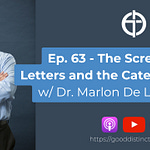NOTE: THIS EPISODE WAS PUBLISHED BEFORE OUR REBOOT. willwrightcatholic.com is now gooddistinctions.com
Acknowledgement
Thank you to my colleague, Mr. Sean Maddigan, M.Ed., for his assistance in the research and formulation of many of the finer points of the atonement of Christ in this episode. Thanks, Sean!
Perception of Serious Problems - Selling Indulgences?
If you say the word “indulgences” to most people today, they would bring up Martin Luther. However, indulgences have been explicitly preached in Catholic theology since the 11th Century, and there have been reductions of penalties since at least the 9th Century. So, where and when does Martin Luther enter the scene?

On October 31, 1517, Fr. Martin Luther an Augustinian monk and lecturer at the University in Wittenberg, Germany, issued his propositions for debate concerning the question of indulgences. The proposed debate was intended to be with Fr. Johann Tetzel, a German Dominican friar and preacher. Fr. Tetzel was an appointed papel commissioner for indulgences and was sent to his native Germany to make money to help build St. Peter’s Basilica in Rome.
From 1503 to 1510, Tetzel preached on indulgences and was effective in doing so. There are countless modern sources which say that Pope Julius II authorized the sale of indulgences, and that, likewise, Pope Leo X sold indulgences too and used the money to build the magnificent St. Peter’s Basilica in Rome. However, the claim that indulgences, as such, were sold seems to be a myth. At one time, one of the spiritual acts that you could receive an indulgence for is contributing to a charitable cause, such as the building of a church. Charitable organizations offer incentives today to increase donations. In the 16th Century, the building fund of St. Peter’s Basilica did increase as the result of Tetzel preaching indulgences.
There were absolutely abuses in the practice of indulgences, to be sure! But it is important to understand what they actually are. One of the main contributing factors to knowledge of the controversy was Martin Luther’s “95 Theses.” In Luther’s time, and especially now, there is no end to the horribly wrong interpretations of the Catholic teaching on indulgences. I have also had a few friends ask if I’d be willing to do an episode on indulgences. So, here you go, gents!
Catholic Understanding of Atonement
After the Fall of Adam and Eve, it was fitting that the atonement or reconciliation of mankind be made by a man. However, what mere man could stand in place of all of humanity? When Jesus Christ died on the Cross, He did so as fully God and fully man. Thus, His death and resurrection were offered in our place, in His humanity, and offered perfectly, in His divinity.
In the sixth Session of the Council of Trent, chapter ii, we hear:
“Whence it came to pass, that the Heavenly Father, the Father of mercies and the God of all comfort (2 Corinthians 1, 3), when that blessed fullness of the time was come (Galatians 4:4) sent unto men Jesus Christ, His own Son who had been, both before the Law and during the time of the Law, to many of the holy fathers announced and promised, that He might both redeem the Jews, who were under the Law and that the Gentiles who followed not after justice might attain to justice and that all men might receive the adoption of sons. Him God had proposed as a propitiator, through faith in His blood (Romans 3:25), for our sins, and not for our sins only, but also for those of the whole world (I John ii, 2).”

There are a lot of things to unpack here. God the Father sent His Son, who was foretold, to redeem the Jews and the Gentiles. This redemption brought with it adoption of each of us by God the Father, in Christ, by the power of the Holy Spirit. The reconciliation or atonement (literally meaning to become “at one” with), comes through the propitiation of sins merited by Jesus’ death on the Cross. The just wrath of God earned by our sin was turned away by the self-offering (the sacrifice and oblation) of our Lord Jesus on the Cross. By His wounds, we are healed, quoting the Prophet Isaiah. The Nicene Creed we profess each Sunday at Mass reminds us of this reality:
“who for us men and for our salvation, came down, took flesh, was made man; and suffered…”
Jesus did not come for Himself, He came to give His life as a ransom for many. We say “many” because not everyone will accept this gift, sad to say. However, this does not diminish that the gift of Christ’s atonement was won for all mankind, without exception. But what is this ransom? Who was holding the souls of the fallen men? It is the Enemy, Satan.
In his commentary on Psalm 95, St. Augustine puts it this way:
“Men were held captive under the devil and served the demons, but they were redeemed from captivity. For they could sell themselves. The Redeemer came, and gave the price; He poured forth his blood and bought the whole world. Do you ask what He bought? See what He gave, and find what He bought. The blood of Christ is the price. How much is it worth? What but the whole world? What but all nations? (Enarration on Psalm 95, no. 5).”
He goes on to explain, in a figure of speech that the Cross was like a trap for the Enemy:
"The Redeemer came and the deceiver was overcome. What did our Redeemer do to our Captor? In payment for us He set the trap, His Cross, with His blood for bait. He [Satan] could indeed shed that blood; but he deserved not to drink it. By shedding the blood of One who was not his debtor, he was forced to release his debtors (Serm. cxxx, part 2).”
The debt owed to Divine Justice was paid in full by Jesus Christ. Divine Justice was satisfied. But not everyone agreed with St. Augustine’s reasoning. St. Anselm and Peter Abelard, for example, rejected the notion that Satan had some sort of right over man. St. Anselm held that an equal satisfaction for sin was necessary to pay the debt to Divine Justice. Abelard, though, did not hold to this strict notion of satisfaction and he argued that God could have pardoned us without requiring satisfaction. So, the Incarnation and the death of Chirst was the pure love of God. And Abelard was condemned by St. Bernard for this view because he argued the effect of the atonement was only moral influence and not any objective payment of a debt.
St. Thomas Aquinas, later, agreed with Abelard in rejecting the notion that full satisfaction was necessary. He agrees with Abelard in so far as the atonement was the greatest demonstration of love, but still holds that under God’s economy of salvation, the sacrifice of Christ objectively paid the debt of justice (which Abelard denied). Restoring mankind to grace was a work of God’s mercy and goodness. It was fitting that Christ should die on the Cross to show the depths of God’s love for us, but not absolutely necessary. Along the ages, Blessed Duns Scotus and St. Bernard of Clairvaux had differing opinions than Abelard and Aquinas.
Though there is disagreement among theologians throughout the ages, what is shared among them is this. The Atonement is essentially a sacrifice and an act of love. The outward Sacrifice is the sacrament of the invisible sacrifice which comes from the heart of God. As the Catholic Encyclopedia puts it so well:
“It was by this inward sacrifice of obedience unto death, by this perfect love with which He laid down his life for His friends, that Christ paid the debt to justice, and taught us by His example, and drew all things to Himself; it was by this that He wrought our Atonement and Reconciliation with God, ‘making peace through the blood of His Cross.’”
Imperfect in the Old, Perfect in the New
In the Old Covenants, the Jewish people would offer “sin-offerings” in which a cereal offering or animal was immolated, offered to God in worship, and then consumed by the priest. Likewise, we get the word scapegoat from the ancient practice of placing, so to speak, all of the sins of the town onto a goat and then releasing the goat to wander into the wilderness, presumably to die.

This ancient notion of atonement was no clearer than on Yom Kippur, the Day of Atonement. The Day of Atonement is centered upon repentance, fasting, asceticism, and the confession of sins. However, the annual nature of this event shows that it is an incomplete and imperfect atonement.
Atonement is made perfect in Jesus Christ, who died once for the sins of man and then rose from the dead, to die no more. In the Holy Mass, Christ does not die again. Instead, the Cross of Christ, a propitiatory Sacrifice is renewed daily in a bloodless manner on the altar.
What Is An Indulgence?
What does any of this have to do with indulgences? Well, everything, really. An indulgence is classically the remission of a debt. In Roman law, it meant to be release from imprisonment or punishment. The Catholic Encyclopedia defines an indulgence as “a remission of the temporal punishment due to sin, the guilt of which has been forgiven.”
So, an indulgence is not permission to sin, it is not stockpiling forgiveness for a future action, nor does it forgive sin or the guilt of sin. An indulgence presumes that God has already forgiven the person receiving it! What is being remitted is the temporal punishment due to sin.
Our sins affect us, our relationship with God, and our relationship with others. Particularly egregious sins, like rape and murder, have lasting effects which cannot be put right this side of Heaven. And putting things right is in the nature of justice. God will always set things right, one way or another, though we might not see it until the end of things. Nonetheless, once someone experiences contrition, there is a deep desire, rooted in justice, to make restitution.

Imagine that you are a kid playing baseball in the street. Of course, this is a bad idea. Mistakes will happen. You know this, and, yet, you wrongly believe that you are special. So, nothing bad will happen. You will hit the ball perfectly and everything will be just fine. Then… you hit the ball and it goes sailing through Mrs. Johnson’s bay window. Immediately, you feel terrible about it. You did not mean for anything to be broken. You experience contrition for the wrong you have done. You knew, of course, that you should not be playing baseball in the street. What did you expect to happen?! Now, you have a choice: run away and hide or go and fess up to what you have done. You decide to go and ask for forgiveness. You ring the doorbell and Mrs. Johnson answers. You immediately apologize for breaking the window and tell her that you are truly sorry. And she forgives you! … That’s it, right? That’s the end of the story?... No way! You still have to make restitution. You have to pay for the window.
In this example, we can see analogously, how we can be forgiven for something, but justice still demands restitution, satisfaction, and even punishment. This distinction between forgiveness and the temporal punishment due to sin seems to have gone by the wayside in Protestant theology over the last five hundred years. Really, if we look at it with fresh eyes, hopefully we can see that it is basic common sense that a wrong done demands restitution. So, why can Protestants not go there? The answer really has to do with Martin Luther. In Luther’s view, we can do nothing to merit our salvation and Catholics agree we cannot merit the gift of initial justification; it is completely a gratuitous gift from God whereby we are covered by Jesus Christ. Nothing in the Lutheran view demands cooperation with grace or even the internal change brought about by Baptism, which Catholicism has always held.
How, Theologically, Does an Indulgence Work?
But with Baptism there is a true change, right down to the core of our being. And grace is given, but our free cooperation is necessary. God’s love does not force itself upon us. This means that our good actions, united with Christ, are meritorious. Our sinful actions require restitution. The Atonement won by Jesus Christ on the Cross is superabundantly meritorious, to use the language of the Church. When we unite our actions with the Cross, they do not add to the merits of Jesus Christ, but they come into communion with them. Likewise, the forgiveness of sins is a communion with the Cross of Jesus Christ! But, in justice, our bad actions still require temporal punishment and restitution. As the 14th Session of the Council of Trent puts it:
“Add to these things, that, whilst we thus, by making satisfaction, suffer for our sins, we are made conformable to Jesus Christ, who satisfied for our sins, from whom all our sufficiency is; having also thereby a most sure pledge, that if we suffer with him, we shall also be glorified with him. But neither is this satisfaction, which we discharge for our sins, so our own, as not to be through Jesus Christ. For we who can do nothing of ourselves, as of ourselves, can do all things, He cooperating, who strengthens us. Thus, man has not wherein to glory, but all our glorying is in Christ: in whom we live; in whom we merit; in whom we satisfy; bringing forth fruits worthy of penance, which from him have their efficacy; by him are offered to the Father; and through him are accepted by the Father (The Council of Trent: On the necessity and on the fruit of Satisfaction).”
Some Protestants hold to the erroneous view of “penal substitution” which is a theory of the atonement that holds that God punished Jesus on the Cross. But there is one glaringly huge problem: an innocent person cannot be justly punished. Jesus took upon Himself the sufferings and death that were due to our sins, but He did not take on the just punishment for our sins.
Understanding How Christ Took on Our Punishment (And What That Means)
Jesus Christ took our punishment upon Himself. As St. Thomas teaches:
“Now by Christ's Passion we have been delivered not only from the common sin of the whole human race, both as to its guilt and as to the debt of punishment, for which He paid the penalty on our behalf (ST III, q. 49, a. 5, co.).”
When discussing the fittingness of the death of Christ, St. Thomas also mentions:
“... in this way Christ by His death brought us back to life, when by His death He destroyed our death; just as he who bears another's punishment takes such punishment away (ST III, q. 50, a. 1, ad. 3).”
Satisfaction means taking up a penalty voluntarily in order to restore justice. St. Thomas Aquinas speaks of taking up this voluntary penalty as someone experiencing something against the will out of charity. In the case of sin and justice, in charity this action makes up for sin because sin is voluntarily doing one’s own will at the expense of charity. In other words, satisfaction derives its power from the strength of the charity of the one offering it. There is no need for Jesus to suffer the pains of Hell to save us because even one drop of His Precious Blood could have satisfied the wrath of God. The payment of Jesus, who is sinless and perfect in charity, merits not only release from punishment. By the Cross, He merits for us eternal life!
When a debt is to be paid, the punishment is measured. In merit, the root of charity is measured. When one merits for another, he merits more for himself. Yet, when one satisfies for another, he does not also satisfy for himself, because the measure of punishment still covers both him and the one on whose behalf he is satisfying. In the case of Jesus, who is without sin, He has no debt to pay. He is satisfying for sinful men out of perfect charity. The punishment He bore made satisfaction for the sins of all mankind and merited more than any man is capable of: eternal life!
Back to Indulgences
Temporal punishment acknowledges that the eternal punishment for sin has been taken away on the Cross, but the temporal consequences of sin still remain. These temporal effects of sin require restitution, to the ability that we are able. We ought to make amends for wrongs done. Expiation, satisfaction, amends, and reparation all mean the same thing when referring to the temporal consequences and punishment due to sin.
Going back to this notion of the superabundant merits of Christ on the Cross, we can also add all of the meritorious actions of the Baptized faithful through the ages, most notably the saints. The Treasury of Merit, as it is called, is the collection of the perfect, infinite, and superabundant merits of our Lord Jesus Christ, the expansive merits of our Blessed Mother and St. Joseph, and the merits of all the just. Our Lord gave to St. Peter, and to the Apostles and their successors, the authority to apply the fruits of these merits at their discretion when He said:
“And I tell you, you are Peter, and on this rock I will build my church, and the gates of hell shall not prevail against it. I will give you the keys of the kingdom of heaven, and whatever you bind on earth shall be bound in heaven, and whatever you loose on earth shall be loosed in heaven (Mt. 16:18-19).”
Likewise, in St. John’s Gospel, Jesus says to the Apostles, and their successors by extension:
“And when he had said this, he breathed on them and said to them, “Receive the Holy Spirit. If you forgive the sins of any, they are forgiven them; if you withhold forgiveness from any, it is withheld (Jn. 20:22-24).”
When a confessor gives absolution to a penitent in the Sacrament of Penance, he is applying this forgiveness of sins which comes from God alone, through the instrument of the priest and the Church. Our guilt for sin and eternal punishment for sin are absolved, but the temporal punishment for sin remains. An indulgence is outside of the sacraments and it does not forgive sins. Instead, it applies the satisfaction of the Treasury of Merit to an individual thereby remitting their temporal punishment due to sin. In other words, by the merits of Christ and the saints, the debt of temporal restitution has been paid in full. The superabundant merits belong to God’s mercy and justice, not to the Church absolutely. So, these concessions or diminishments of punishment are administered by the Church but they come from God as a free gift.
There is value in what Christ has done for us. But there is also value in what Christ does through us. Either way, the primary action is God. But with our cooperation, we unite ourselves with the Sacred Action of Jesus. As St. Paul said:
"Now I rejoice in my sufferings for your sake, and in my flesh I complete what is lacking in Christ's afflictions for the sake of his body, that is, the church (Col. 1:24).”
What could possibly be lacking in the sufferings of Christ, except for our cooperation with His grace and our own meritorious actions? Not only do our good actions possess the value or merit, they also certainly possess the value of satisfaction.
Luther Had a Couple Good Points, But a Lot of Errors
It must be said that Martin Luther had some great points in his 95 Theses. In fact, only 41 propositions of Luther’s from the 95 Theses and his other writings up to that point, were rejected as heretical, scandalous, erroneous, seductive of simple minds, in opposition to Catholic truth, or offensive to pious ears by Pope Leo X in 1520.
Let us look at the first three of the 95 Theses:
“When our Lord and Master Jesus Christ said, ‘Repent’' (Mt 4:17), he willed the entire life of believers to be one of repentance.
This word cannot be understood as referring to the sacrament of penance, that is, confession and satisfaction, as administered by the clergy.
Yet it does not mean solely inner repentance; such inner repentance is worthless unless it produces various outward mortification of the flesh.”
All three of these are true. Interior repentance is a reorienting of one’s entire life, not just a momentary “I’ll try a bit harder.” This call of our Lord to repentance does not refer to the Sacrament of Penance because it is a call which is first addressed to those who do not yet know Christ and the Gospel. And finally, interior conversion should find expression in visible signs, gestures, and penitential actions.
It does seem, though, that Luther is presupposing that indulgences were being sold, with official authorization. This myth is prevalent today and it appears it was in Luther’s day as well. Indulgences are drawn from the Treasury of Merit and applied freely when those seeking them fulfill the requirements with proper disposition. Luther’s 95 Theses presents many theological errors in this regard. These errors are still being repeated today. For example, this 2009 article from “The New York Times” which gets it wrong from the title (the content of the article only goes from wrong to worse, by the way): “For Catholics, a Door to Absolution is Reopened.”
By the way, to show just how seriously the Church took these abuses, Pope St. Pius V, in 1567, issued a decree which canceled all grants of indulgences involving any fees or other financial transactions.
Seeking an Indulgence
Many Catholics think that indulgences, per se, were an abuse. They are not. And though it was a focal point in the Protestant Reformation, indulgences did not go anywhere. As the Catechism of the Catholic Church stated in the 1990s:
"An indulgence is obtained through the Church who, by virtue of the power of binding and loosing granted her by Christ Jesus, intervenes in favor of individual Christians and opens for them the treasury of the merits of Christ and the saints to obtain from the Father of mercies the remission of the temporal punishment due for their sins… to spur them to works of devotion, penance, and charity" (CCC 1478).
Everything that I have presented about indulgences belongs to the infallible teachings of the Church. We are not at liberty to dismiss them, diminish them, or disbelieve in them. The Council of Trent’s anathema makes this clear:
The Council of Trent "condemns with anathema those who say that indulgences are useless or that the Church does not have the power to grant them."
The Church does not remit temporal punishment due to sin with magic or the wave of a pen. The person who suffers those temporal punishments must be disposed to repentance and faith. As Pope St. Paul VI said:
"Indulgences cannot be gained without a sincere conversion of outlook and unity with God (Indulgentarium Doctrina, 11).”

Before the Second Vatican Council, indulgences were said to remove a certain number of “days” from punishment. Instead, this was to show that indulgences have two types: plenary and partial. Plenary, meaning full, means that all temporal punishment due to sin that a person owed is being remitted. Whereas, a partial indulgence remits part of the temporal punishment due to sin. In order to make this clearer, Pope St. Paul VI revised the handbook of indulgences (called the Enchiridion).
As we have covered, satisfaction and temporal punishment for sin are ordered towards justice on the one hand and purification on the other hand. So, the actions for which one might receive an indulgence should likewise be ordered to justice, charity, and purification. Because the justice of God has been satisfied through the merits of Christ and the saints, applied to our lives, then the “time,” so to speak, needed for purification in charity after death has been lessened.
Just as a checkpoint or reminder: indulgences remit the temporal punishment due to sin, not eternal punishment. Eternal punishment is remitted fully by the Cross of Jesus Christ, the merits of which we receive in the Sacrament of Baptism.
Knowing rightly what an indulgence is, how can we receive this great gift? Please forgive the following lengthy quotation, but Jimmy Akin put it concisely and excellently in his Primer on Indulgences for EWTN:
“To gain any indulgence you must be a Catholic in a state of grace. You must be a Catholic in order to be under the Church's jurisdiction, and you must be in a state of grace because apart from God's grace none of your actions are fundamentally pleasing to God (meritorious). You also must have at least the habitual intention of gaining an indulgence by the act performed.
To gain a partial indulgence, you must perform with a contrite heart the act to which the indulgence is attached.
To gain a plenary indulgence you must perform the act with a contrite heart plus you must go to confession (one confession may suffice for several plenary indulgences), receive Holy Communion, and pray for the pope's intentions. (An Our Father and a Hail Mary said for the pope's intentions are sufficient, although you are free to substitute other prayers of your own choosing.) The final condition is that you must be free from all attachment to sin, including venial sin.
Because of the extreme difficulty in meeting the final condition, plenary indulgences are rarely obtained. If you attempt to receive a plenary indulgence, but are unable to meet the last condition, a partial indulgence is received instead.”
The Church offers us special indulgences, both plenary and partial, for all sorts of things. But there are a couple of partial indulgences worth mentioning here. Partial indulgences are given by the Church for:
Devoutly spending time in mental prayer,
Reading Sacred Scripture with veneration as a form of spiritual reading (this one is plenary if done for at least 30 minutes),
Devoutly signing oneself with the Sign of the Cross and saying the customary formula: “In the name of the Father, and of the Son, and of the Holy Spirit. Amen.”
Conclusion
Indulgences are not magic. They are a part of the infallible teaching of the Church. And they are for our spiritual well-being.
We should not be wary of officially promulgated indulgences. We should be grateful to God for His superabundant mercy and His justice. Recognizing that we are sinners in need of His grace, we approach the Sacrament of Penance. Then, we do penance to seek temporal satisfaction and restitution for the consequences of our sins. All the while, we ought to seek out indulgences, because they are nothing more than being union and communion with Almighty God and striving to be more in love with Him who loved us first.
Suggestions for Further Reading:
Atonement: Soundings in Biblical, Trinitarian, and Spiritual Theology by Margaret Turek, S.T.D. (Ignatius Press)
The Spirit of the Liturgy by Joseph Cardinal Ratzinger (Ignatius Press)
20 Answers - Protestantism (20 Answers Series from Catholic Answers) - Kindle Edition












